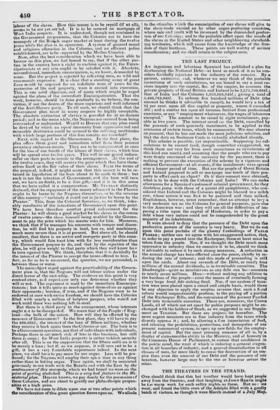THE LAST PROJECT.
AN ingenious and laborious Spaniard has published a plan for discharging the National Debt—at least so much of it as he con- siders decidedly injurious to the industry of the country. By a patient, extensive, and, whatever we may think of the probable correctness of such calculations, we are bound to say a most cu- rious inquiry into the capital, &c. of the empire, he assumes the private property of Great Britain and Ireland to be 3,575,700,000L; that of India and the Colonies 1,833,068,9461.; giving a total of 5,408,768,946/. To redeem five hundred millions of Debt (the amount he thinks it advisable to cancel), he would levy a tax of 91 per cent. upon all this capital or Property, where it exceeded 304 ; and a similar tax upon all incomes derived from professional exertions, or any " employment whatsoever, the wages of labourers excepted." The amount to be raised bj eight instalments, pay- able in two years. The interest saved cst the Debt, cancelled by the proceeds of each quarterly instalment, to be applied to the remission of certain taxes, which he enumerates. We may observe en passant, that lie has not made the most judicious selection, and that the duty on Seaborne Coals is virtually abolished already.
This scheme is possible, yet impracticable. Supposing his cal- culations to be correct (and, though somewhat exaggerated, we think them not very far from such correctness as calculations of this kind can reach), and assuming that the people who are to pay were firmly convinced -of the necessity for the payment, there is nothing to prevent the execution of the scheme by a vigorous and efficient Government—at all events, if the instalments were spread over a longer period of time. But are the people of Great Britain and Ireland prepared to sell or mortgage one tenth of their pro- perty to effect such an ebject? Or if their consent were obtained, what is to be done with the Colonies and India? We can make allowances for a Spaniard's notions of colonial government, for they doubtless jump with those of a quaint old pamphleteer, who con- sidered that Ireland and the Colonies might be likened to a much cow, whose nature it was first to be pastured and then milked. Englishmen, however, must remember, that an attempt to levy a very moderate tax on the Colonies for general purposes, gave rise to the American war ; and they will see all the difficulties of im- posing a tithe upon the capital of Hindostan, in order to pay a debt whose very nature could not be comprehended by the great majority of its inhabitants. It were absurd to deny that the pressure of the Debt upon the productive powers of the country is very heavy. But we do not upon this point partake of the gloomy forebodings of Penh° PEBRER ; neither can we agree with his exaggerated notion, that, in order to pay a pound into the Exchequer, three at least must be taken from the people. Nor, if we thought the Debt much more Oppressive to industry than we conceive it to be, should we think it advisable to reduce it by such strong measures. A reduction in the annual charge has been effected since the peace, chiefly by re- clueing the rate of interest; and this mode of proceeding is still upon the cards. About one seventh of the Debt, or nearly four millions of the annual dividends, is in terminable annuities. The Deadweight—quite as mischievous as any debt can be—amounts to nearly seven millions. Here—without making any addition to the burdens of the people—exist the means of eventually forming a very large bond fide sinking-fund. Nor, if our system of taxa- tion were once placed upon a sound and simple basis, would there be any objection to apply the surplus revenue that such a fiscal retbrm would unquestionably produce, to the paying off a portion of the Exchequer Bills, and the conversion of the present Funded Debt into terminable annuities. There are, moreover, the Crown Lands, all of which not set apart for public purposes might be ex- changed with the holders of Stock, as we suggested in our Supple- merit on Taxation. But these are projects for hereafter. The more urgent measures are to free industry from the taxes which directly oppress it ; and, by allowing a Lee importation of food, and relaxing the prohibitions, protections, and monopolies of our present commercial system, to open up new fields for the employ- ment of capital. But the most pressing measure of all is, by a display of statesmanlike ability in the Ministry, and of honesty in the Commons House of Parliament, to restore that confidence nt the public mind, the want of which is inducing a general stagna- tion in all branches of industry, and a general dissatisfaction in all classes of men, far more likely to cause the destruction of an em- pire than even the amount of our Debt and the pressure of our taxation, however large may b3 the one or however severe the other.
















 Previous page
Previous page